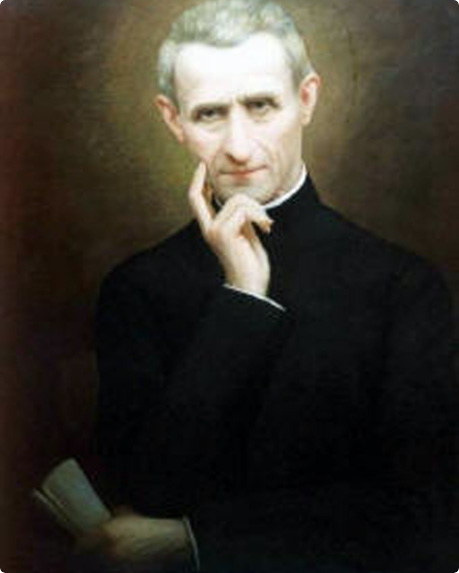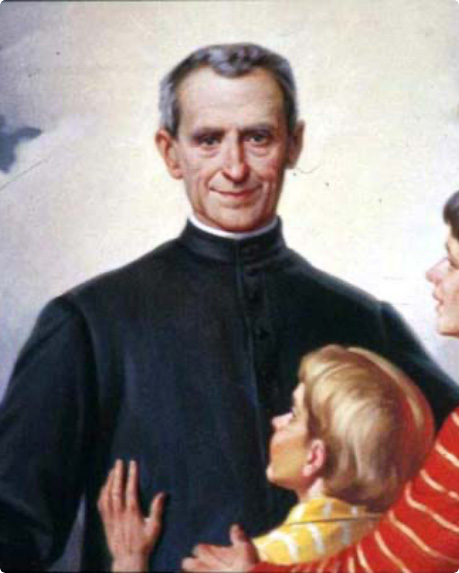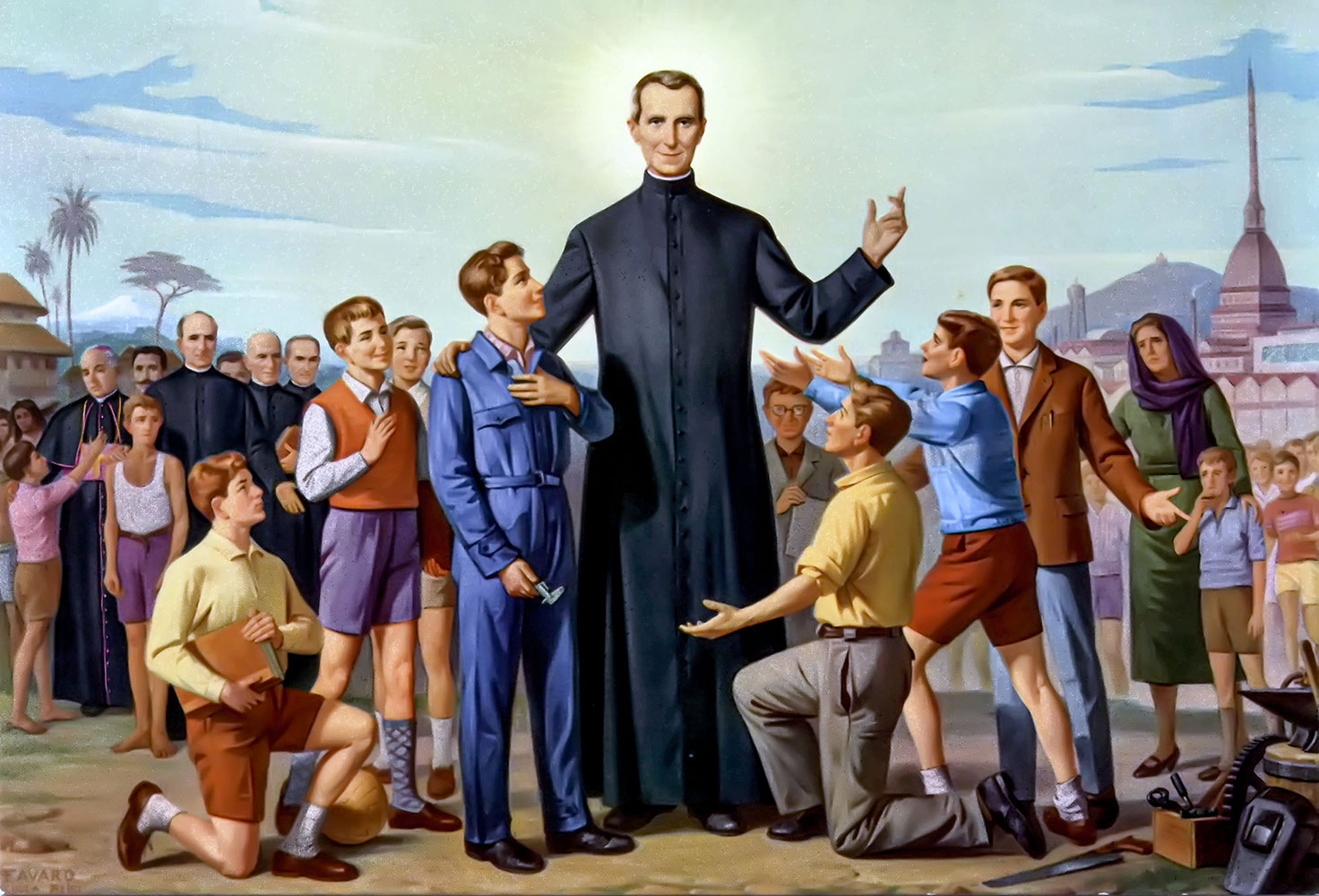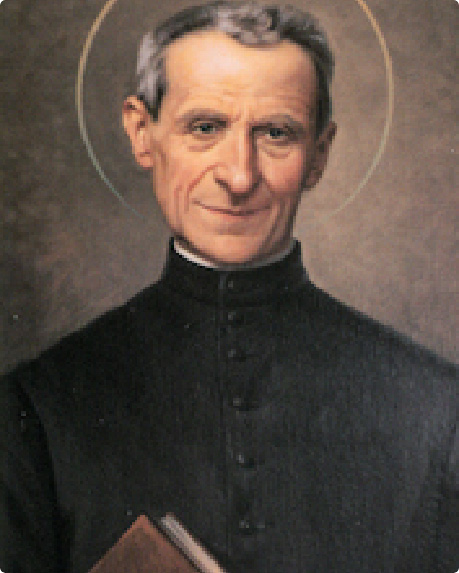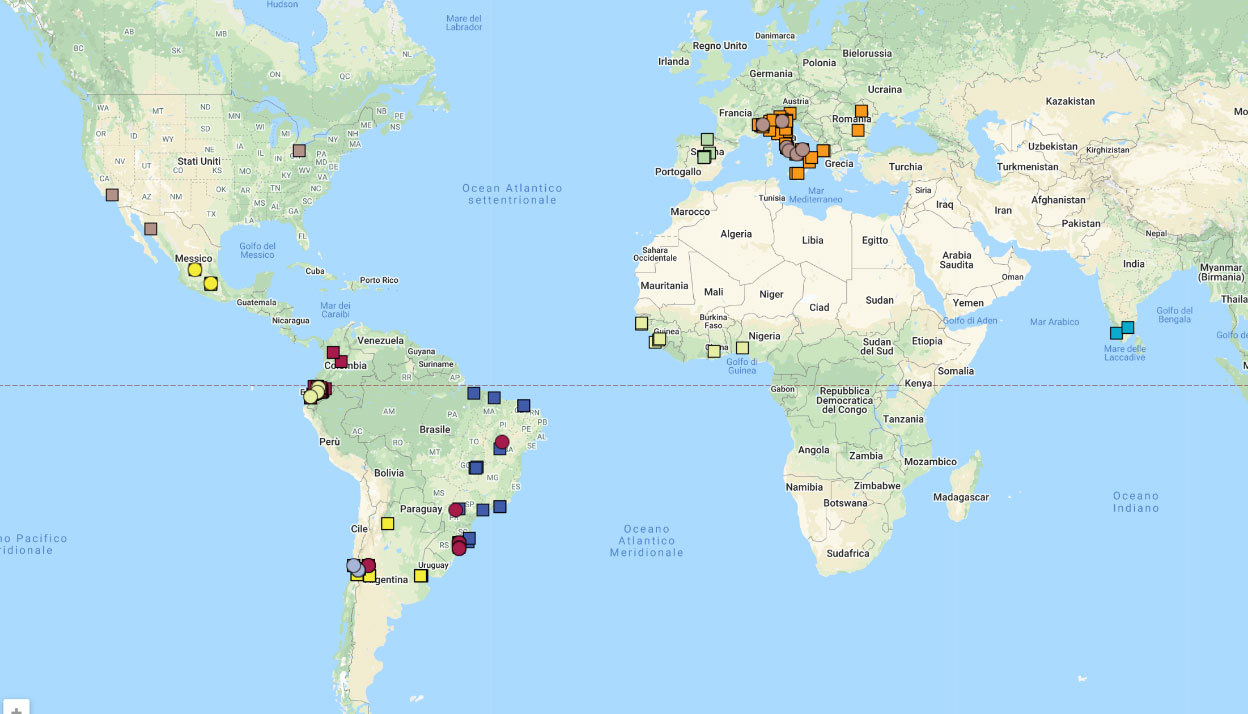JOSEPHITES
FAMILY OF MURIALDO
The "Congregation of St. Joseph" was born from the heart, rich in faith in God and sensitivity towards neighbors in need, of St. Leonardo Murialdo (1828-1900), and was founded in Turin on March 19, 1873, in the Collegio Artigianelli, of which Murialdo was rector.
OUR ICON
St. Joseph

«Our Pious Society has the high honor of being named after St. Joseph the Spouse of the Virgin Mary. This denomination, suggested by the need to put our work under such patronage, was born with the Congregation itself, which, from the beginning, was consecrated to St. Joseph. It inherited, with the name, part of the confreres of the secular Congregation, previously established in our Artigianelli college in Turin, which later changed into a religious congregation.
His cult had its greatest manifestation, when Pope Pius IX, of venerable memory, solemnly proclaimed "on December 8, 1870, St. Joseph the Universal Patron of the Church. Only three years later, our Pious Society was established, and placed under this very valid patronage. Like ours, so other institutions, both male and female, took their name from St. Joseph.
Saint Joseph, therefore, is for us that faithful and prudent servant whom God has placed in charge of his Family and of whom we must take direction and example. He must inform our Congregation of his spirit, which, in the very name of this Saint, has already clearly outlined the program of his being and his work. Therefore the virtues of St. Joseph must be ours, and his ministries must be ours.
St. Joseph is the speaking rule of the Congregation, in which everything must be Josephine, and from which everything that is not according to the spirit of St. Joseph must be excluded.
Among the virtues, the following must be eminent in us: humility; hidden life and poverty accompanied by a fervent devotion to the Immaculate Virgin and to the Sacred Heart of Jesus. In fact, no one, more than Saint Joseph, knew and appreciated the privileges of Mary, and no one more than Him, after Mary, penetrated into the secrets of the love that God has brought to men.
As for works and ministries, we learn from St. Joseph the hard work, the zeal of souls, especially of the young, and the genius of sacrifice.
If we want our Congregation to endure and spread in the Church of God, it is indispensable that not only the name but also the spirit of St. Joseph be kept alive in it. If this were to be lacking or diminished, God forbid !, it would also diminish the life of the Congregation and its ministries would dull; because the institutions live and thrive by virtue of that spirit that created them.
And so, like the other Congregations they live and prosper, which especially for obedience, as for the most rigid poverty, as for preaching, as for teaching. Our Congregation will have a prosperous and lasting life if, in the careful and diligent imitation of Saint Joseph, we always try to practice humility and charity, its characteristic virtues, and if it constantly profits in them ». (Taken from Il fine della Pious Turin Society of St. Joseph by d. Eugenio Reffo - co-founder of the Congregation of St. Joseph - Printing house PP. Giuseppini - Pinerolo - pp. 33-35)
Saint Joseph said "yes"
Joseph was a person who always said "yes" to God and in the Gospels, little is said about him. And that he speaks even less, in fact he doesn't even say a word.
The only two occasions in which we speak of him are that in which Jesus becomes man, enters the human world and the history of the salvation of Israel (his birth, all that prepares it, the presentation in the temple) and that in which Jesus becomes an adult and enters the social world of the time (the finding of him in the temple).
Therefore if we speak of Joseph we are referring strictly to Jesus, because he is in function of Jesus.
The long list of men who transmit life (of each it is said: "begotten") stops with Joseph and Joseph seems to be able to be the father of Jesus only because ... generated is an Other from him.
This mystery of the life of Joseph is light for the mystery of our adventure as human beings, because it is an indication of the first step that allows us too to enter the family of Jesus, the one he himself will speak of saying "Who is my mother, who they are my brothers?". Moreover, if at first glance it seems that it is Jesus who enters the family of David, it is better said that it is the family of Abraham and David, through Joseph, who joins the little family of Mary who carries Jesus in himself born through the work of Holy Spirit.
Joseph is that Joseph we know because he is the husband of Mary, who in turn is the mother of Jesus. The one in the other and the other in herself are attentive spectators of God who passes by. From this interior stopping, from this renunciation of letting oneself be taken by so many anxieties that has its practical implication in the time of prayer - a time in which it is God who acts while we silence and curb all the raids that inhabit our mind - this stopping therefore is the cultivated and prepared soil that makes it possible for the seed thrown in us to sprout, because it blooms and makes us pronounce that word, "Yes!", which is, in God's eyes, the most beautiful fruit of our freedom.
Joseph approached Jesus through Mary, and was his educator and father.
St. Leonardo Murialdo chose Joseph as a model for the congregation of religious he founded so that, thanks to the intervention of Mary, mediator of all grace, they welcome the Lord in the least of their brothers.
WHO WE ARE
The “Congregation of St. Joseph” was born from the heart, rich in faith in God and sensitivity towards neighbors in need, of St. Leonard Murialdo (1828-1900), and was founded in Turin on March 19, 1873, in the Collegio Artigianelli , of which Murialdo was rector. This institution had the purpose of assisting, educating in a Christian manner and training poor, orphaned and abandoned children for professional work.
Murialdo, in this educational context and animated by his previous apostolic experience with the children of the suburbs of Turin, after a long discernment, begins the congregation with the specific purpose of dedicating himself "to the Christian education of poor, orphaned or abandoned young people or even solo discoli”, that is, in need of being redeemed from a morally disordered life. While this is the primary purpose, the congregation can "come to the aid of adults belonging to the working classes with education and preaching".
To achieve this purpose some institutions were born, such as colleges, orphanages, reformers (juvenile prisons), agricultural colonies, oratories, and then "any other work" without any limitation of the type.
As titular, patron and model of the congregation, whose members are clerics and lay brothers, St. Joseph was chosen, the humble craftsman of Nazareth and above all the exemplary educator of Jesus. From him the congregation must learn that pedagogy that finds its synthesis in evangelical charity and that style of life, made up of personal and community behaviors and attitudes, which are summed up in the characteristic virtues of humility and charity.
The congregation, which received diocesan approval on February 24, 1875, began its journey, not without some difficulties, of organizing within it, especially as regards the formation of new members, of clarification of its spiritual and apostolic identity, opening up also to the training of young people of "civil condition" (wealthy young people), of its development and its diffusion, which had Piedmont as its first field, then Veneto and later other regions of Italy.
In view of the pontifical approval of the congregation, the definitive drafting of the Constitutions was started. The congregation was approved by the Apostolic See on June 17, 1897 and the Constitutions on August 1, 1904.
After the death of the Founder, on March 30, 1900, the congregation opens up to missions abroad (Libya, 1904), a perspective already present in the first rule of the congregation, and to the countries of Latin America (Brazil, 1915).
In the meantime, the congregation deepened some aspects of his life, in particular his spirituality and his pedagogy, having as reference the writings of the Founder and in particular his spiritual Testament. In this document, expressly left to his spiritual children, Murialdo exhorts them to make the infinite, tender and merciful love of God, the source of their spiritual and apostolic life, and the object of their preaching.
Based on the indications of the Second Vatican Council, the congregation, with the special chapter of 1969, revised its legislation and the "new" Constitutions, more enriched with the spirit of the congregation's tradition, were approved by the Apostolic See on 8 December 1983.
Today the congregation is called in the Church to live and bear witness to the merciful love of God by dedicating itself to the human and Christian promotion of poor young people, abandoned and in need of social and moral formation.
The educational activity is carried out through multiple works according to the countries in which it operates and the social and ecclesial situations in which it is located, such as schools, vocational training centers, family homes, oratories, colleges, missions. Even the parishes, not included in the initial project, became part of the apostolic activity by the will of Pope Saint Pius X (1909). However, as Josephan parishes, they take on a specific characterization due to the importance given to youth ministry.
The congregation currently operates on four continents: in Europe (Italy, Spain, Albania, Romania), in Africa (Sierra Leone, Guinea Bissau, Ghana), in America (Brazil, Ecuador, where there is also an apostolic vicariate in the Napo mission. , Argentina, Chile, United States, Colombia, Mexico), Asia (India).
With all the other ecclesial realities that are inspired by the charism of the congregation and with the lay people who participate in it, the Murialdine Sisters of St. Joseph, the Secular Institute of St. Leonard Murialdo, the Laity of Murialdo ..., the "Murialdo Family" was established in whose members, according to their specific vocation, live some spiritual and apostolic aspects of the congregation's charism, in the spirit of an ecclesiology of communion.
The coat of arms of the congregation is formed by the initial letters of Iesus, Maria, Ioseph - IMI - inside an oval line surrounded by rays. It recalls the intimate union of the Holy Family of Nazareth.
The abbreviation with which the congregation identifies itself is "CSI" (Congregatio Sancti Ioseph), to which the indication "Giuseppini del Murialdo" is added.
WHAT WE DO
From its origins, the Congregation of Saint Joseph had in the Church the specific mission of dedicating itself to poor young people, abandoned and most in need of help and Christian education.
Faithful to this charism, it continues to make present in the Church the mystery of Christ who he loves the poor and blesses the children.
Attentive to the signs of the times and with the commitment to adapt to the changing needs of people and places, the congregation offers in its institutions and with its activities a home and a family to young people who do not have them, a chance to study and training for work, a place for free time, an educational environment and above all a center of evangelization and Christian life.
The congregation carries out its specific apostolate through different institutions, such as oratories, family homes, agricultural colonies, re-education institutes, boarding schools, schools, works for orphans, youth, social and work preparation centers, the missions and parishes.
These are characterized by the choice of a popular territory, and the commitment to offer an adequate service especially to the most needy youth.
Criteria that verify the validity of a work as a Josephine are: constant dedication to poor youth, usefulness for the environment and the local church, the witness of a Christian service, the relevance and effectiveness of educational methods, collaboration with the laity and, normally, also economic sufficiency.
Professional training
In all the provinces the congregation has Vocational Training Centers: this activity is characteristic of our action.
In the educational service of evangelization of the poorest and most needy young people, training for work has become, for our congregation, an adequate response to the question of preparation for life expressed by young people in different parts of the world.
The congregation promotes the elevation of the working class especially by training young people who enter the world of work.
Through intellectual, professional, social and Christian formation, the congregation intends to help young people, a living force for the transformation of society, to face their future with responsibility and security. In this way it works for justice and peace and collaborates with men of good will in building a society more worthy of man.
Hospitality
Service to the poorest and most abandoned young people finds in the service of hospitality one of the most developed and growing achievements in our congregation.
The great variety of structures that operate it - family homes, foster families, day care centers, housing communities ... - is characterized
- from a personalized educational relationship with each child,
-
from a training proposal centered on the "pedagogy of love", typical of our Murialdine charism
- from a strong desire to be ever more faithful to Murialdo's words: «Poor and abandoned: these are the two requisites that make up a young person like one of ours; and the poorer and more abandoned he is, the more he belongs to ours"
School
Our typical way of serving the evangelization of young people, in the charism of Murialdo, always passes through the educational dimension. This principle applies specifically to school.
Each Josephan school has as its foundation educating by evangelizing and evangelising by educating.
Murialdo's educational style, summarized today in the proposal of the "pedagogy of love", "centered on the education of the heart", reaches many children and they attend our schools in the countries where the Josephites are present.
San Leonardo aimed to form "good Christians and honest citizens"; “Ne perdantur” - so that they do not get lost, as he used to say; his formative proposal, which was addressed to the person of the boy in his entirety, was always aimed at his salvation and his happiness. It was an "educate for heaven”.
Missions
Artisans of peace, the missionaries animate schools and canteens, work in clinics, awaken hope in favelas and bidonvilles. The Josephites of Murialdo, who, in over 100 years, have arrived in about fifteen countries around the world driven by a passion for the Gospel and for man, committing all their lives and energies of mind, heart and ... arms, to the point of paying, not infrequently, even on their skin their loyalty.
The commitment of the congregation in the missions is very old, because already in the First Regulation there is the will to go beyond the borders of the mother country, even if this desire will materialize only in 1904, with the sending of the first missionaries to Benghazi, in Libya.
In the footsteps of the first missionaries who left for North Africa, Fr. Girolamo Apolloni, fr. Maurizio Costa and fr. Carlo Alunno, hundreds of other Josephites then crossed borders, seas and oceans over the years, to bring the Gospel to the four corners of the world:
on 1 December 1914 they leave Genoa for Brazilian lands p. Oreste Tromben and d. Giuseppe Longo
in 1922 p. Emilio Cecco and Fr. Giorgio Rossi set sail from the same port to reach the Apostolic Vicariate of Napo (Ecuador), while
in 1933 another group of missionaries reached Tripoli to set up an agricultural colony there.
, crossing seas or rivers, was always a source of serious dangers, as well as tropical diseases, without forgetting the need to get food or learn the local language.
But the difficulties do not slow down the missionary enthusiasm of the congregation, and new fronts of apostolate are opening up in other countries of the world:
- Argentina in 1936,
- Chile in 1947,
- the United States 1949,
- Spain in 1961,
- Sierra Leone in 1979,
- Colombia in 1983,
- Guinea Bissau in 1984,
- Mexico in 1990,
- Albania (where Fr Ettore Cunial will be killed, assassinated) in 1996,
- Romania and India in 1998,
- Ghana in 1999.
The real challenge of missionaries is always to inculturate the Gospel in people's lives, to incarnate the message of salvation in daily life, being careful not to impose it and not to present it as something that comes from afar. For this reason, they are always careful to pay attention to and respect the local culture, valuing the traditions of the territory in the liturgy and in the education of young people.
But not a few problems have ultimately come to make the work of missionaries more difficult. Globalization has expanded the offer of information, but with it, the confrontation with Western civilization and consumerism have spread, which in third world countries is a source not only of theft and robbery, but also of frustration and depression. In Africa and Latin America the problem of sects is also very strong which, taking advantage of people's ignorance and their desire for happiness, have a lot of grip on the population, promising illusory happiness and within reach.
congregation, particular problems are added to the global ones: in Sierra Leone missionaries find themselves having to "rebuild" the people terrified by the cruelty of a long civil war; in Argentina they clash with poverty and unemployment in large urban centers; in Colombia with drug trafficking and guerrillas.
Another common element is the corruption of governments, which creates enormous difficulties for the customs clearance of containers with aid, obtaining an authorization, providing the population with the resources to which it is entitled.
But to new problems, new solutions, Murialdo said.
The Programming Lines of the last General Chapter of the congregation confirm this: "We see with joy and encourage the commitment and dedication of the confreres and lay people in the mission of missionary awareness in the congregation, the opening of new fronts of evangelization and human promotion in poor countries of the world and in the peripheries of large urban centers ”.
In short, ready to accept the new challenges that the modern world will present to the passion for the Gospel and for the Josephite religious.
Parish and Oratory
The pastoral service of evangelization of the people of God that we as a congregation provide in the context of the mission of the Church is also carried out through parishes and oratories.
The Josephan parishes, in addition to offering pastoral care to all the people of God entrusted, are characterized by a special attention to children and young people, especially the poorest and most needy. This love of predilection is to be an engaging choice of the whole community.
A motto that is both an objective and a challenge: “in the Josephan parish, no young people without a family”.
In the oratories, places of welcome and meeting for children and young people, the Josephites, together with many other educators and volunteers, offer an educational service that is open, joyful, full of warm cordiality.
"Praying, learning and playing, this is the oratory," Murialdo repeated.
Recreation and sport, intellectual and cultural deepening, growth in spirituality, are the foundations of his educational proposal, the "Pedagogy of Love", focused on educating the hearts of young people.
International Meetings
The formative and pastoral activity of the congregation finds significant moments of experience and comparison for the revision and planning of the journey, in some meetings at the international level, in addition to those at the provincial level.
Worth mentioning:
- the general chapter, which manifests in the highest way the communion of life and apostolic activity of the congregation
- international conferences, in which the superiors of the provinces participate together with the superior general and his council
- the Murialdine month, a typical experience of formation that is celebrated every three years in a different province, open to all confreres
- the meetings of the formators, which bring together the leaders of the international and provincial formation teams of the congregation
- the meetings of the provincial treasurers, coordinated by the general treasurer.
Some international meetings are lived as the Murialdo Family [FdM] and therefore see the participation as protagonists, together with the Josephites, also of young collaborators and educators, of the Murialdine Sisters, of the Murialdo Secular Institute and of the Murialdo Laity.
Between these:
- the meeting of Josephan pastoral representatives
- the Murialdine Pedagogy Seminars
- the Josephine Pastoral Forum, a moment of arrival and relaunch of a journey kept alive through constant contact through a virtual forum
- the international meeting of the FdM
- the meeting of the young people of the FdM


